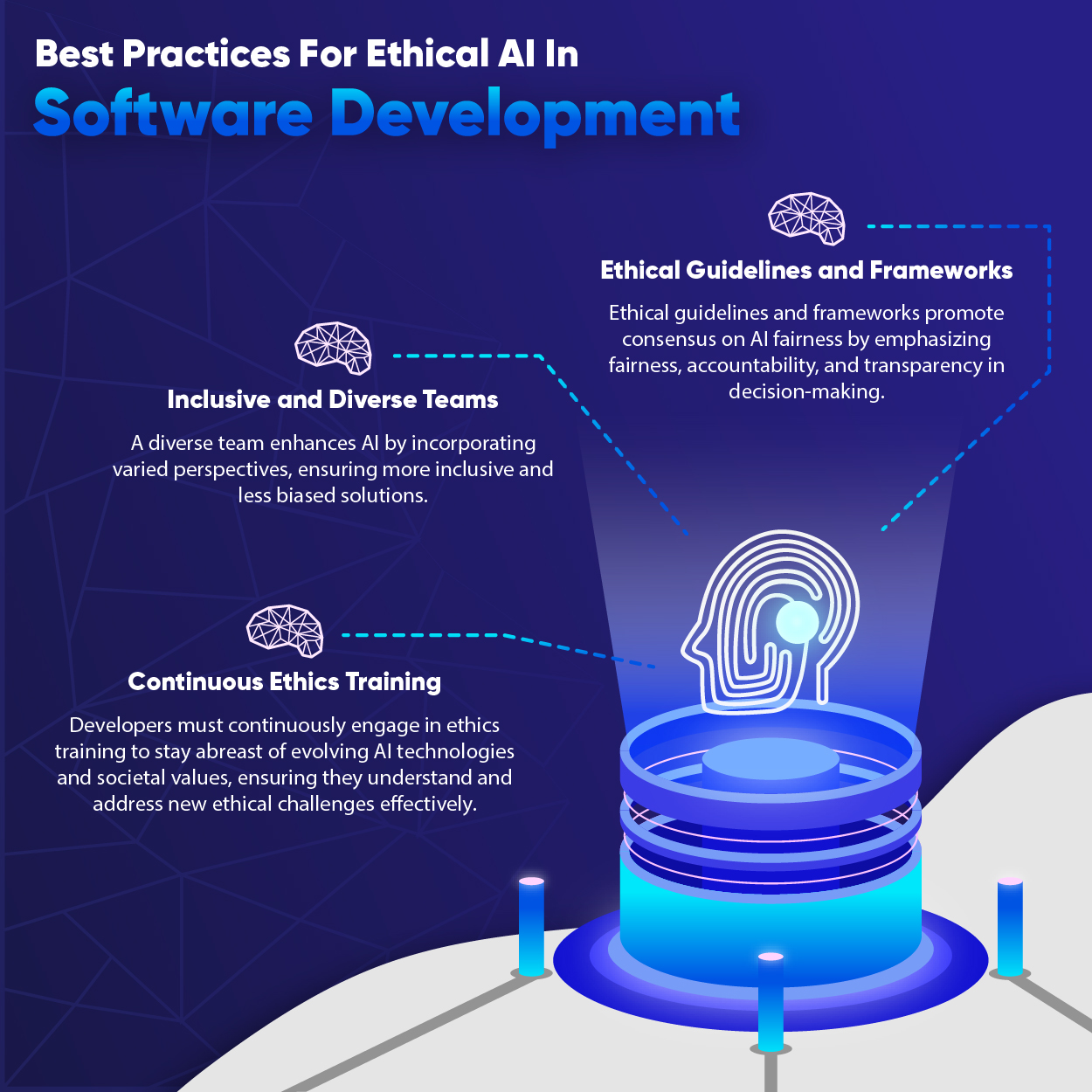Ethical concerns are growing as AI becomes more popular in software development. Integrating AI into software development can increase productivity and innovation and raise ethical conflicts. These include problems of impartiality, accountability, transparency, and the impact of the implemented technology on society as a whole. This article will examine these ethical issues and highlight the importance of integrating ethical frameworks into AI deployment strategies within software development.
Understanding AI Ethics in Software Development
What is AI Ethics?
AI ethics are all about making sure we build, use, and use AI technology responsibly. We need to consider how this technology affects people and the environment in software development. This includes everything from the initial design stage to the implementation and beyond. We need to recognize the impact of this technology and work to ensure that everyone uses it appropriately and safely at all times.
Why Ethical AI is Necessary
There is more to developing AI than just about preventing harm. It’s also about building trust and making sure that the technology benefits society over time. These days, software developers are seen as responsible for technology, societal norms, and safety, so it’s really important to consider ethics in AI as a key part of professional practice.
Key Ethical Issues in AI Deployment
Bias and Fairness
AI programs often present biases in their training profiles or procedures. This can lead to software that supports racial, gender, or socioeconomic inequalities. To address these problems, it’s important to have solid strategies for handling data, diverse teams, and continuous monitoring for bias.
Transparency and Clarity
In AI, transparency refers to how stakeholders understand the functionality of AI systems, while clarity refers to the ability to explain how AI decisions are made. Ensuring both is essential in software development for debugging, improving system performance, and maintaining public trust.
Accountability
Who is responsible when an AI system fails or causes problems? Having clear accountability is crucial in software development. This means we need to explain who is responsible for maintenance and take corrective measures if something goes wrong.
Privacy
AI systems often handle a lot of personal data. It’s essential for developers to protect this data from being misused and to make sure they follow global privacy rules like GDPR.AI systems frequently process vast amounts of personal data. Safeguarding this data against misuse and ensuring compliance with international privacy standards like GDPR are fundamental ethical obligations for developers.
Ethical Guidelines and Frameworks
Using ethical guidelines and frameworks can help us all agree on what’s fair regarding AI. These frameworks usually have fairness, accountability, and transparency, making it easier to decide what to do.
Inclusive and Diverse Teams
Having a diverse team can help create AI systems that are less biased. When developers hear from people with different backgrounds, they can make sure their AI solutions work for everyone. Inclusion is the key to building better AI!
Continuous Ethics Training
Developers need to keep up with ongoing ethics training. As AI tech and society’s values change, developers must stay on top of ethical AI practices and understand new challenges and solutions. By having regular training, they can make sure they’re always in the loop.
The Role of Regulation and Industry Standards in Ethical AI
Importance of Regulation
Regulations are crucial when it comes to ethical AI. They set the basic standards for good behavior and ensure companies play by the rules so everyone stays safe and keeps it honest. Regulations can help reduce risks by ensuring companies are transparent about data use, accountable for their actions, and following some basic standards. By doing this, they can help businesses use AI ethically and transparently.
Industry Standards and Certification
Aside from following the rules and regulations, companies can demonstrate their commitment to appropriate AI practices by complying with industry standards and certifications. These standards, such as the ones created by software engineering professional organizations, set up responsible behavior and technical excellence benchmarks. By keeping these standards, companies can differentiate from others in a competitive market and earn users’ and stakeholders’ trust.
Ethical AI as a Competitive Advantage
Building Trust with Users
Companies that prioritize appropriate AI practices benefit by gaining the trust of users who value insight and fairness. This is important because new technologies sometimes create fear or uncertainty. However, companies focusing on ethics are more likely to attract and retain users. And, of course, that trust is key to the long-term success of AI technologies.
Innovation and Durability
Innovation is often driven by ethical considerations caused by technical and human values. Focusing on the right AI can help companies avoid problems and find new opportunities to create new products that meet people’s needs. Not only that, but ethical practices also help ensure that AI solutions remain sustainable and in the marketplace for a long time.
Challenges in Implementing Ethical AI
Scalability of Ethical Practices
Scalability is a big challenge in ensuring AI ethics in software development. Maintaining ethical standards will become more and more difficult as AI becomes more complex and applied in different contexts. Developers must ensure they can adjust and make guidelines strong enough to tackle the technology’s growth.
Balancing Innovation and Ethical Constraints
One of the challenges of AI is that developers balance their ethical responsibility with the pressure to create exciting new solutions. It’s easy to lose track of ethics in the rush to create something brilliant. However, we need to figure out how to balance innovation with ethics to succeed.
Future Directions in Ethical AI
Continuous Learning
AI is constantly changing, and so are the ethical issues that may come up. To stay up to date with the newest technical advancements and shifting audience expectations, developers must always learn and grow. Ethical AI must regularly update practices, guidelines, and training to keep up with the latest developments in context and knowledge.
Collaboration Across Sectors
Government, industry, schools, and communities must work together to ensure the ethical development of AI. We can develop creative solutions to ethical issues by sharing ideas and creating code.
Leveraging Ethical AI for Enhanced User Experience
User-Centric Design
Designing the right AI is all about focusing on users and their needs. The main idea is to make solutions available and not exclude anyone. We must consider the conditions under which customers will interact with the AI once it is built. The user will enjoy the experience and, if we do it right, will be happy with the results. It all hinges on making ethical AI more straightforward and user-friendly, increasing user engagement.
Impact on User Trust and Loyalty
When companies care about the ethical use of AI, it really affects our level of trust and loyalty as customers. Customers are more likely to use and promote the company’s products to others if they are good to us. This is important in markets where there are many similar products to choose from. Companies that use AI ethically are more likely to build reputations and generate greater revenues in the long term.
Implementing Ethical AI
Integrating Ethics into Agile Development
Adding ethical considerations to agile development can be tough because it moves so fast. But if you start thinking about ethics early on, you can avoid expensive or harmful mistakes later. To do this, you should assess ethical risks during sprint planning or have meetings where you reflect on the ethics of the AI solutions you’re developing.
Tools and Technologies to Support Ethical AI
Developers can use different tools and technologies to make sure their AI systems are ethical. Some of these tools include software that detects bias automatically, frameworks to secure data privacy, or AI-powered tools that explain how the AI makes decisions for the users. These technologies are very helpful in following ethical guidelines, making AI applications more reliable and robust.
Promoting an Ethical Culture in Software Development
Leadership and Ethical Advocacy
In the software development industry, leaders play an essential role in setting ethical standards for their companies. Promoting beneficial AI communicates a preference for long-term rather than short-term profits. This means they sometimes have to make difficult choices, such as delaying product launches, to address ethical concerns, which ultimately pays off for the company and stakeholders.
Community Engagement and Feedback
It’s always better to involve more people and get their opinions when working on AI projects. That way, we can ensure we consider different perspectives and create fair and equal solutions. Regularly checking in with users and stakeholders helps us stay on track with what society expects from us.
Custom and Integrated AI Solutions
At Sonatafy Technology, we are excited to share our newest AI Journey service, offering unique, integrated solutions created by our AI engineers specifically for your company’s needs. Our AI resources are designed to help clients dramatically accelerate the integration of AI into their business and gain the advantage of staying ahead in our highly competitive tech landscape. Our expert AI team can help develop strategic and complex AI concepts, ensure data readiness, build the resources, and execute market-ready products. Use our customized AI Journey & Integration Process to significantly increase productivity and expand to new opportunities in tech!
Conclusion
Software developers must integrate ethical considerations into every phase of AI development. Not only does it help them comply with legal standards, but it also means they can create technology that’s actually good for society. Embracing ethical AI practices will be a huge part of the future of software development. It’ll help us create powerful, innovative, fair, and trustworthy technologies everyone can use.
Source:Ethical AI In Business




